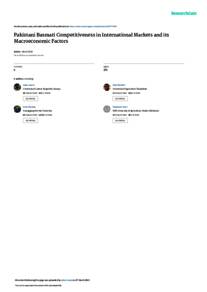وثيقة
Pakistani basmati competitiveness in international markets and its macroeconomic factors.
المعرف
DOI: 10.17582/JOURNAL.SJA/2020/36.1.303.310
المصدر
Sarhad Journal of Agriculture. v. 36, 1, p. 303-310
المساهمون
Abdur Rehman., مؤلف
Khaliq, Farhana., مؤلف
Razzaq, Amar., مؤلف
Yasin, Mudassar., مؤلف
Mustafa, Ghulam., مؤلف
Bakhsh, Allah., مؤلف
Saqib, Raheel., مؤلف
الدولة
United Kingdom.
الناشر
ResearchersLinks Ltd.
ميلادي
2020-01-01
اللغة
الأنجليزية
الملخص الإنجليزي
Competitiveness is defined as the ability of a country to offer commodities that encounter domestic and worldwide quality standards and provide satisfactory returns on the resources which is used in production of a commodity. Nominal protection coefficient (NPC) is projected for the time period of 2003 to 2016 for using as a dependent variable in the current study. To estimate the impact of different macroeconomic variables on basmati export competitiveness panel data set is used following Park's Feasible Generalized Least Square (FGLS). According to the results of the study about the impact of macroeconomic variable on basmati competitiveness, inflation has negative and significant effect on export competitiveness of Pakistani basmati. Inflation in trading partner has positive and significant effect on basmati export competitiveness of Pakistan. Exchange rate of Pakistan is negatively affecting the basmati export but exchange rate of trading countries is positively affecting the basmati export of Pakistan. Dummy for Muslims and joint boarder is also positively affecting the basmati export of Pakistan. Basmati markets are categorized into three types. First category of high potential markets include UK, Canada, and USA. The 2nd category include middle potential markets which include Oman, Saudi Arabia, Iran, Turkey and United Arab Emirates. Third category include the low potential markets which has low competitiveness are Yemen, Poland and Qatar. It is recommended that Pakistan basmati exporter must concentrate to enlarge the basmati export share to UK, Canada and USA because these markets has strong potential and competitiveness. It is further recommended that the basmati exporters must try to find out the way to export to Oman, Saudi Arabia, Iran Turkey and United Arab Emirates instead of Yemen, Poland and Qatar.
ISSN
1016-4383
قالب العنصر
مقالات الدوريات

